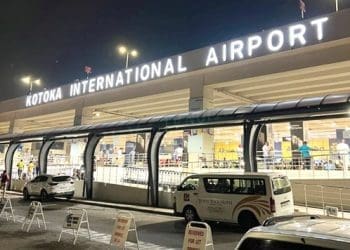A high-level delegation from Zanzibar has paid a working visit to Ghana to learn from the Jospong Group of Companies’ acclaimed waste management model.
Led by Mr. Abdullah Mgongo, Director of Planning, Policy and Research at the Office of the President of Zanzibar, and Ms. Sabra I. Machano, Municipal Director of the West B Municipal Council, the delegation toured key facilities of Zoomlion Ghana Limited—Jospong’s flagship sanitation subsidiary to learn about urban sanitation.
The visit was aimed at exploring sustainable solutions to Zanzibar’s growing urban waste management challenges by drawing inspiration from proven African models.
The Jospong Group, a trailblazer in Ghana’s sanitation and environmental sector, has over the years built a comprehensive and scalable waste management ecosystem that has become a benchmark across Africa.

Tour of state-of-the-art waste infrastructure
During their tour, the Zanzibar team visited several of Zoomlion’s advanced waste infrastructure sites, including waste sorting and composting facilities, integrated recycling plants, and engineered landfill systems.
The delegation observed first-hand how Ghana is tackling its urban sanitation challenges through an integrated, community-to-industry waste management strategy.
“We are deeply impressed by the systems we’ve seen here—from community-level waste collection to high-end processing facilities,” said Mr. Mgongo.
“It is clear that Jospong’s impact goes beyond sanitation; it drives job creation, environmental sustainability, and economic transformation.”

He emphasised Zanzibar’s interest in replicating elements of the Ghanaian model, adding, “What Jospong has achieved in Ghana is remarkable. We see a clear opportunity for partnership, especially as Zanzibar pushes forward with reforms in our municipal waste management strategies”, and urban sanitation.
Call on Ghana’s Local Government Minister
As part of the visit, the Zanzibar delegation paid a courtesy call on Ghana’s Minister for Local Government, Decentralisation, and Rural Development, Ahmed Ibrahim, who received the guests on behalf of President John Dramani Mahama and the people of Ghana.

The Minister commended the Jospong Group for its pioneering role in sanitation and its contribution to positioning Ghana as a hub for sustainable waste management solutions on the continent.
He expressed Ghana’s commitment to supporting African cooperation in sanitation, environmental protection, and infrastructure development.
Africa-wide vision for waste solutions
The Director of International Business at the Jospong Group, Dr. Alexander Kumi-Larbi Jnr., said the visit was a testament to Jospong’s growing reputation as a pan-African force in sustainable development.
“Our model is proven,” he said. “Over the past decade, we have developed a complete waste management ecosystem in Ghana that is now being studied and adopted by other African governments.”
Dr. Kumi-Larbi Jnr. highlighted the Group’s readiness to support Zanzibar and other countries through technology transfer, strategic partnerships, and local capacity-building.

“Through strategic partnerships, technology transfer, and local capacity building, we are ready to support countries like Zanzibar to build resilient, modern, and environmentally responsible waste systems,” he said.
Driving green transformation across Africa
Jospong’s Africa Expansion Strategy aims to replicate Ghana’s success in other African countries through public-private partnerships and tailored infrastructure solutions.

The strategy also aligns with the Group’s broader goal of promoting sustainable urban development and creating thousands of green jobs across the continent.
The visit by the Zanzibar delegation represents another milestone in Jospong’s continental footprint and solidifies its standing as a visionary and reliable partner in Africa’s green transformation journey, as well as urban sanitation.
With rising demand for effective waste management systems across the continent, Jospong’s model stands as an African-grown solution to one of the continent’s most pressing urban development challenges.













